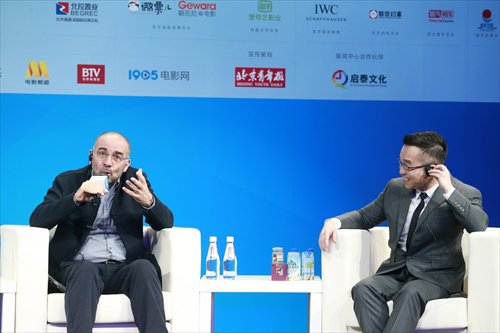China seeks to use co-productions to become world’s top film industry

Italian director Giuseppe Tornatore (Left) and Monster Hunt director Raman Hui attend the Sino-Foreign Film Co-production Forum in Beijing on Sunday. Photo: Li Hao/GT
International co-productions have been a hot topic of discussion in the Chinese film industry in recent years. This year's Beijing International Film Festival was no exception.
Besides the annual Sino-Foreign Film Co-production Forum held Sunday, a series of similar talks and forums took place throughout the festival. "Boundless Blockbusters: The ongoing Sino-Foreign Film Producing," was held on Monday and a "China-US Film Investments & The Globalization of Chinese Films" followed on Tuesday.
One of the most influential festivals in the Chinese film industry, the forums gathered a number of industry insiders from influential entrepreneurs such as Bona Film CEO Yu Dong and Oriental DreamWorks CEO Fang Gan to film producers Iain Smith and Hollywood actress Natalie Portman.
In-depth cooperation
"How can we make Chinese films that can be appreciate by global audiences?" "What can we learn from the Hollywood?" and "What can we learn from working with international teams?" are some commonly seen topics at these forums. Though few conclusions have been reached, one thing many in the industry tend to agree on is that the Chinese market is slowly taking center stage.
"Big changes in the film industry and film production are happening between China and the US. On one hand the Chinese film industry is developing rapidly, and on the other hand, the Hollywood film market is showing a tendency towards a gradual decline… the executives in Hollywood are making more and more sequels, which helps them avoid mistakes but leads to a lack of innovation. They are increasingly reluctant to take risks on new themes and stories," Yu said during the festival. He stated that this will lead to young directors choosing to turn to China rather than Hollywood.
Yu's bold remarks on Sunday attracted a lot of attention, leading to them becoming one of the topics for the next day's discussions.
"I don't think a loss of talent will definitely happen," Fang refuted on Monday.
"Even if foreign talents are here, it will still take time for a foreign scriptwriter to write a story that can resonate with Chinese audiences."
However, Philip Lee, a producer for The Revenant, stated that he has known US scriptwriters to come to China due to the lack of opportunities in the US. "There are many in fact," Lee said Monday, explaining that just three days ago he received a message from a US friend who wanted to adapt his previous script to a Chinese story.
As to the size of the Chinese market for films, Yu predicted on Sunday that China's current strong growth is sure to continue for at least the next decade. According to him, the number of screens in China will continue to grow at a rate of about 6,000 to 8,000 screens every year for another five to eight years.
"At the moment, China has 35,000 cinema screens while North America has 39,000. At current speeds, by the end of this year the number of screens in China will surpass that of North America. And in five years, that number will double that of North America's… China's box office will reach 150 to 200 billion yuan ($23-30.9 billion), three times that of current North American revenue," Yu said, adding that co-produced films in the future will mainly be led by Chinese investors.
While not as confident as Yu, Fang also noted that the Chinese market has stood out from the crowd. "There used to be only one film market, which is the US. But today things are different, now the world has two - China and the US," he said.
Chinese ambition
Behind all these forums and summits, the ambition of Chinese industry insiders to build their own "Chollywood" to take on the global market is clear.
While mainlanders were overjoyed about a decade ago how the mainland market was attracting Hong Kong talent north, now their excitement has turned to having Hollywood filmmakers, some of the best talents in the film industry, come work for the Chinese market.
This excitement is spreading. A Monday report from the National Business Daily was fully confident that with the help of the country's capital resources, China is sure to become the next Hollywood.
However, while those within the industry are ecstatic over co-productions, local audiences' still seem rather indifferent.
On Sina Weibo, one of the most popular social media platforms in China, discussions about co-production are few and far between. This is understandable. While filmmakers see a bright future when it comes to the potential co-productions represent, audiences are more concerned with whether the co-productions made so far have been any good.
In many people's opinions things don't look good in that regard as many remember failed experiments such as the forced scenes in Iron Man 3 and Transformers 4 and the critically panned Outcast just to name a few.
"We have to start from the basics. Scripts are very important," Carrie Wong, head of local production film & TV for Sony Pictures Entertainment's Greater China region, pointed out at the discussion on Monday.
According to Wong, figuring out how to get scriptwriters from China and the US to work well together is what the industry should focus on.
"There are many talented Chinese scriptwriters, their dialogue is very true to life, but they can learn a lot from Hollywood when it comes to story and world-building," she added.
Newspaper headline: Cheer for ‘Chollywood’